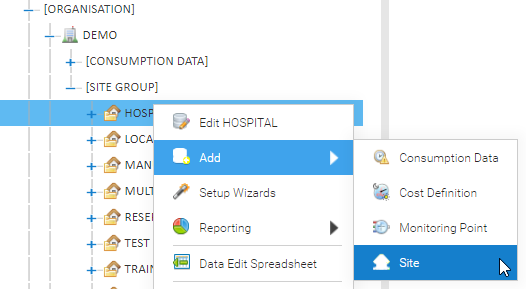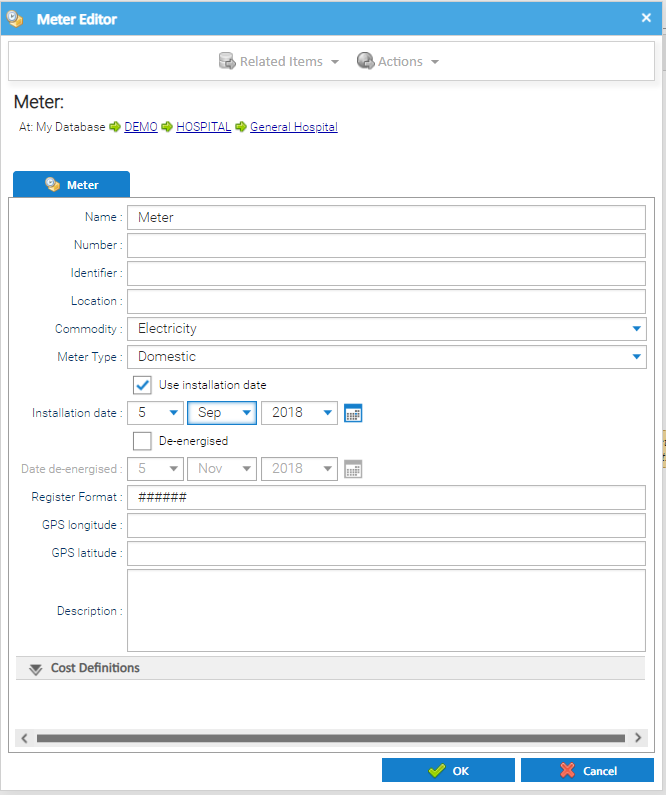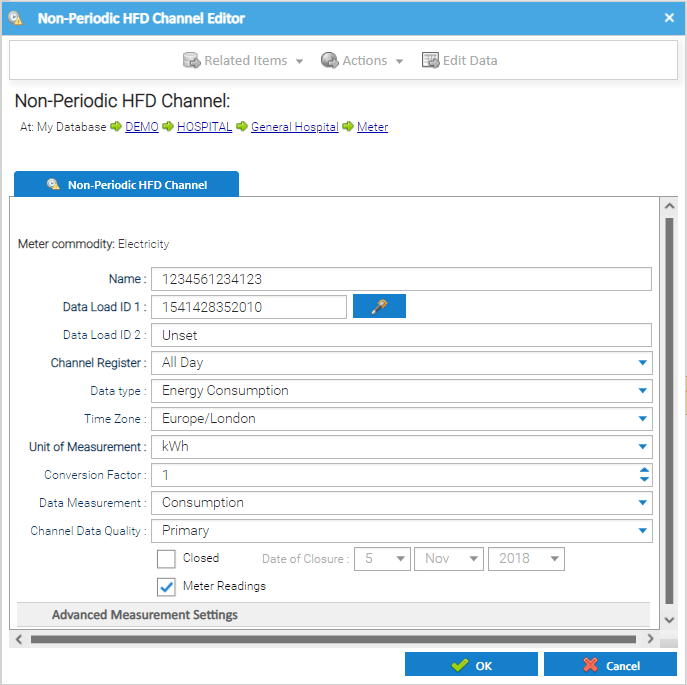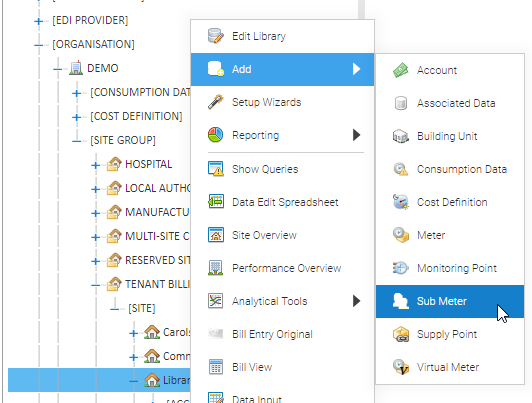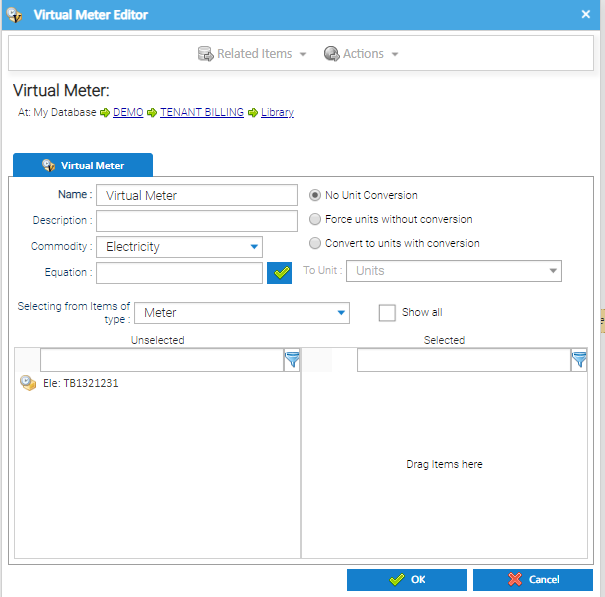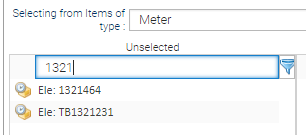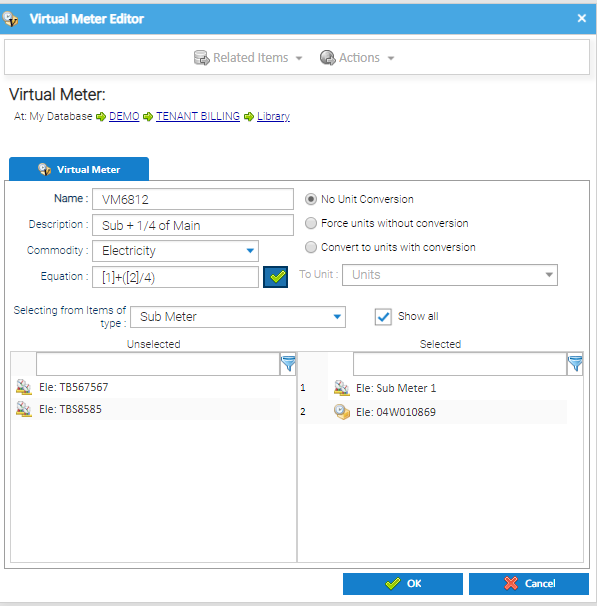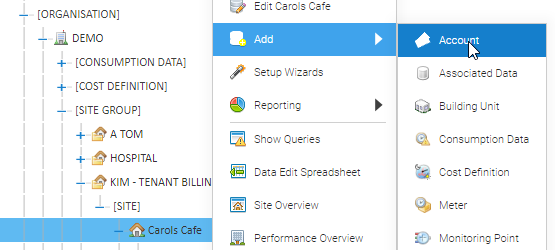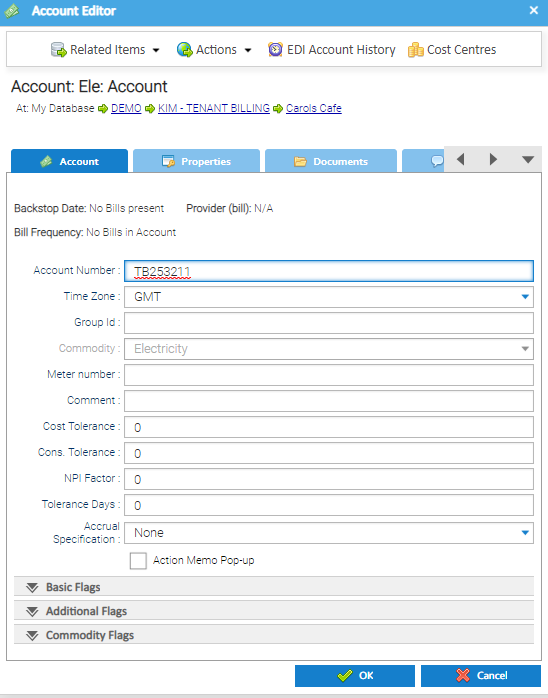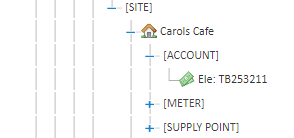When you have a new Site, you will need to create the Site and any Accounts, Meters, Sub Meters, Virtual Meters, Channels and Supply Points.
This section also shows how to create a Tenant and a Tenant Account and associated Contracts, Tariff, Cost Definitions etc.
Adding a Tenant, Site etc
- Create the Site (if it doesn't exist already)
- Create the Meter (or Sub Meter or Virtual Meter) (if it doesn't exist already
- Adding a Sub Meter
- Adding a Virtual Meter
- Create the Account (if you require the consumption from Utility bills)
Once you have created these (or they may already exist), you create the Tenant and the associated Items:
Work through this page, or click on the links below to jump to the section
- Create the Tenant
- Create the Tenant Account
- Create the Tenant Contract
- Create a Cost Definition (if it doesn't exist already)
- Create a Tariff
- Create the Tariff Connector (if using Consumption from the Utility Bills)
- Create a Tenant Supply Point
- Add to a Billing Group
Adding Sites, Meters, Accounts etc
You will not need to set these up if they already exist in Sigma.
However, if they do need to be set up, see below:
Adding a Site
Right click on the Site Group
Enter the Site Name, Benchmark, ID's on the Site tab
Click on the Location tab and enter the address details
Click OK
Adding a Meter
Right click on the Site
Click Add
Click Meter
| Field | Description |
|---|---|
| Name | Add the Meter Serial Number |
| Number | Add the Meter Serial Number |
| Identifier | Add the Meter Serial Number |
| Location | Enter the location (if known) |
| Commodity | Choose Electricity, Gas, Water etc |
| Meter Type | Choose Code 5, Domestic etc |
Use installation date | Tick to add a date |
| Installation date | Add the date the meter was installed |
Click OK
Adding a Periodic Channel
Once you have a Meter, you need a Channel to hold the consumption data.
Choose either Non-Periodic Channel or Periodic Channel.
Right click on the Meter
Click Add
Click Non-Periodic Channel (or Periodic Channel)
| Field | Description |
|---|---|
| Name | Enter the name of the Channel (usually the supply number or the meter number) |
| Data Load ID 1 | If half hourly downloads, this will need to be the identifying number on the import |
| Data Load ID 2 | Rarely used, but some imports may have 2 IDs |
| Channel Register | Choose from All Day, Day, Night etc (default is All Day) |
| Data type | Defaults to Energy Consumption for Gas and Electricity, change to Volumetric Consumption for Water |
| Time Zone | This should be the same as the Time Zone set in the Billing Group. Click here for details of the Billing Group Setup |
| Unit of Measurement | Defaults to kWh for Gas and Electricity, change to M3 for Water |
| Conversion Factor | Defaults to 1 |
| Data Measurement | Defaults to Consumption |
| Channel Data Quality | Defaults to Primary |
| Closed | Only used if closing the Channel |
| Meter Readings | Tick to indicate that the consumption will be entered in meter readings (not as consumption values) |
| Field | Description |
|---|---|
Minimum Value | Defaults to 0 |
| Auto Max | Untick to allow a Maximum Value to be added |
| Maximum Value | This is the reading at which the meter clocks. For example it the maximum amount of numbers in the reading is 5, then 99999 would be entered into this field. Once this reading is reached, the Meter will clock |
| Clocking Threshold (CFT) | A figure between 0 – 100 (percent) is added. 0 would mean the Meter never clocks, 100 would mean if the Meter Reading entered is lower than the previous, Sigma will assume it has clock. Its recommended to add a figure of 100 |
| Max is Last | Defaults to unticked |
Right click on the Site
Click Add
Click Meter
Complete the Meter Editor pop up in the same way that you would a standard Meter (see above)
Once created, create a Non-Periodic or Periodic Channel underneath, in the same way that you would for a standard Meter (see here)
Adding a Virtual Meter
A Virtual Meter can be added when you don't have an actual meter and you want to use consumption values from one or more other Meter or Sub Meters.
Virtual Meters can also be used with calculations. For example you may have a Sub Meter in a Shop Unit, but you also want to charge a portion of the Main Meter. Both Meters are added to the Virtual Meter and a sum entered with the equation.
Right click on the Site
Click Add
Click Virtual Meter
| Field | Description |
|---|---|
| Name | Enter the name for the Virtual Meter |
| Description | (optional) |
| Commodity | Choose from the dropdown |
| Equation | Leave blank if you want to add together all of the Meters in the Selected section An example equation may be that you want to charge for a Sub Meter and a 1/4 of the Main Meter. The Equation would be [1]+([2]/4). |
| Selecting from items of type | Defaults to Meter. Can be changed to:
When you change the Item type here, the Unselected box will show any available |
| Show all tickbox | Tick to show all available Meters across the whole database |
| Unselected | Shows any available Meters for the Site The search field allows you to search all the Meters |
| Selected | Drag and drop Meter(s) from the Unselected section |
Click OK to save
Adding an Account
An Account is required if you intend to enter your Utility Bills into Sigma and then use the consumption details for billing Tenants.
Right click on the Site
Click Add
Click Account
| Field | Description |
|---|---|
| Account Number | Enter the Utility bill Account Number |
| Commodity | Choose the Commodity from the dropdown list |
Click OK to create the Account
Creating a Tenant
A Tenant will need to be created it you are creating a new Site or moving a new Tenant into an existing Site.
The Tenant screen holds details of the Tenants name and VAT Registration Number along with a Location tab to enter a billing address.
Right click on the Organisation
Click Add
Click Tenant
Alternatively expand the Tree Selector
Right click on TENANT
Click on Add Tenant
The Tenant Editor opens
Configure the Tenant details as follows:
| Field | Description |
|---|---|
| Name | Name of the Tenant |
| Trading Name | (optional) - Trading name of the Tenant |
| Registered Company Number | (optional) - Registered Company number of the Tenant |
| Billing Email Address | (optional) - Billing mail address of the Tenant |
| Contact Email Address | (optional) - Contact email address of the Tenant |
| Tenant Reference | Enter the name you want to appear on the bill |
| Arbitrary Reference | (optional) -This can be used to record information about the Tenant Provider that is relevant to your business |
| VAT Registration Number | VAT registration number of the Tenant. This will typically appear on Tenant invoices where they are created |
| Location Tab | Enter address details for the Tenant. This will typically appear on Tenant invoices where they are created |
Click on the Location Tab
Add details in the Contact Address fields if you want the billing address to appear on the bill
Click OK to save
The Tenant details are saved and the Tenant Editor closes
Creating the Tenant Account
A Tenant Account need to be created for each Supply Point that represents the supply of a Commodity to the Tenant.
The Tenant Account is added under a Tenant:
Right click on the Tenant
Click Add
Click Tenant Account
The Tenant Account Editor opens.
Configure the Tenant Account details as follows:
| Field | Description |
|---|---|
| Account Number | Enter the Account Number of the Tenant Account. Note: As there is a one-to-one relationship between a Tenant Account and a Supply Point, it is good practice is to enter the Supply Point Name and Commodity for consistency. Example: Community Centre_585656545654565646646_Electricity |
| Time Zone | Select a value from the dropdown list. Consumption data (stored in GMT) will be converted to this time zone in Tenant Billing. |
| Commodity | Choose from the dropdown list, for example, Gas, Electricity, Water |
| Settlement type | Choose from the dropdown list (Other, Cheque, Direct Debit). |
| Payment Terms (Days) | Enter a value between 0 and 400 (the amount of days before the invoice is overdue) |
| Arbitrary Reference | (optional) - this can be used to record information about the Tenant Account that is relevant to your business. |
| Charge name | If required add/view/edit/delete Adhoc charges |
Click OK
The Tenant Account details are saved and the Tenant Account Editor closes.
Click OK to save the Tenant Account
Creating a Tenant Contract
The Tenant Contract is under the Tenant Provider in the Tree Selector. A Tenant Provider represents the Organisation / Site Manager that is billing the Tenants and holds the Contracts and Tariffs for Tenant Billing.
If this doesn't already exist, set up new Provider using this page: Adding / Maintaining a Tenant Provider.
A Tenant Contract may already exist.
To check this:
Click on the Tenant Provider in the Tree Selector
Click CONTRACT
Right click on the Contract to view the details
If not, create as follows:
Right click on the Tenant Provider in the Tree Selector
The Contract Edit pop up opens
Complete the popup as follows:
| Field | Description |
|---|---|
| Displayed Name | This field is automatically generated |
| Title | Name of the Contract |
| Commodity | Choose the Commodity |
| Service Type | Choose Tenant |
| Quality | Defaults to Normal |
| Tariff | Defaults to No Tariff |
| From date | Choose the from date |
| To date | Choose the to date |
| Permanent tick box | Tick to override the From and To dates |
Click OK to save and create the Tenant Contract
The Contract is now visible under the Tenant Provider
Creating a Cost Definition (if it doesn't exist already)
Click here for more details on how to create a Cost Definition
Creating a Tariff (if it doesn't exist already)
Click here for more details on how to create a Tariff
Creating a Tariff Connector (if using Consumption from the Utility Bills)
Click here for more details on how to create a Tariff Connector
Creating a Tenant Supply Point
The Tenant Supply Point brings the Items together to enable billing, such as the Tenant, Meter, Account and Contract.
The Tenant Supply Point is created under the Site. There is a separate Supply Point for each commodity.
Right click on the Site
Click Add
Click Supply Point
The New Supply Point Commodity popup opens
Select the Commodity
Note: For Electricity - untick Inlcude MPAN data on Electricity Supply Points ans a 'fully MPNA' is not required
Click OK
Enter the Supply Point Name, for example CoffeeShop_MHQ_Ele
Copy and paste the Name into both the Reference and Identifier fields
Note: When using more than one word, separate with an underscore otherwise the spaces are stropped out when imported using a tag.csv file.
Click OK to create the Tenant Supply Point.
The Tenant Supply Point is now visible in the Tree Selector, but will show in red as no Items have been associated with it.
Associating a Tenant Supply Point with Tenant, Meter, Account and Contract
The Items associated with the Supply Point will be used to bill the Tenant.
Open the Tenant Supply Point
Right click on the Tenant Supply Point from the Tree Selector
Click Edit
The Supply Point Editor popup opens.
Change the Supply Point to Tenant
Click Tenant in the Supply Details
Add the Contract Dates
Click
The Manage Contract for Tenant popup opens.
Click to start the Contract
Sigma will default to show a start date of today and tick No end date.
If you do not need a start or end date, tick No start date
Alternatively, tick or untick the start and end dates as required and amend the dates as required
Add the Contract
Click on the dropdown and select the relevant Contract
Add the Tenant Account
Click on the magnifying glass to add the Tenant Account
The Tenant Account Selector popup opens:
Click on the magnifying glass to view all Accounts
Highlight the Account
Click OK to return to the Manage Contract for Tenant popup
Add the Meter
Drag and drop the Meter from the Available Meters to the Selected Meters section.
Click OK to return to the Supply Point Editor popup where you can see the associated Items have been added
Click OK to close the Supply Point Editor
Adding a Tenant Account to a Billing Group
Now the Supply Point has been set up along with the Tenant, Tenant Account etc, this needs to be added to a Billing Group to enable bills to be produced. The Tenant Account will be defined as Unassigned until it is attached to a Billing Group
The Tenant Billing Groups are shown in the Tenant bill Run Initiation Activity.
To add your new Tenant Account to a Billing Group:
Click on the Tenant Bill Run Initiation icon in the Sigma Welcome Screen:
or select the Tenant Billing from the Sigma Activities dropdown list
Select the Tenant Bill Run Initiation sub-menu item:
The Tenant Bill Run Initiation screen opens as shown below:
Select the Tenant Billing Group in the Tenant Billing Groups section
Click on
Select the required Filter options
Click Apply Filter to search and select the required Unassigned Tenant Account(s)
Highlight the Account
Click Assign at the top of the section
Alternatively right click on the Tenant Account
Click Assign
The selected Tenant Account is assigned to the Tenant Billing Group highlighted at the top of the screen
The screen is updated so that the selected Tenant Account is no longer displayed in the Unassigned Tenant Accounts section.
